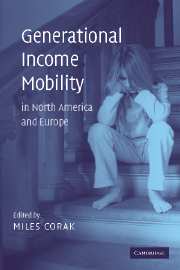Book contents
- Frontmatter
- Contents
- List of figures
- List of tables
- List of contributors
- Preface
- 1 Generational income mobility in North America and Europe: an introduction
- 2 A model of intergenerational mobility variation over time and place
- 3 Equal opportunity and intergenerational mobility: going beyond intergenerational income transition matrices
- 4 Intergenerational mobility for whom? The experience of high- and low-earning sons in international perspective
- 5 What do trends in the intergenerational economic mobility of sons and daughters in the United States mean?
- 6 Changes in intergenerational mobility in Britain
- 7 Intergenerational mobility in Britain: new evidence from the British Household Panel Survey
- 8 Non-linear patterns of intergenerational mobility in Germany and the United States
- 9 Family structure and labor market success: the influence of siblings and birth order on the earnings of young adults in Norway, Finland, and Sweden
- 10 New evidence on the intergenerational correlation in welfare participation
- 11 Intergenerational influences on the receipt of unemployment insurance in Canada and Sweden
- 12 Unequal opportunities and the mechanisms of social inheritance
- Index
- References
3 - Equal opportunity and intergenerational mobility: going beyond intergenerational income transition matrices
Published online by Cambridge University Press: 22 September 2009
- Frontmatter
- Contents
- List of figures
- List of tables
- List of contributors
- Preface
- 1 Generational income mobility in North America and Europe: an introduction
- 2 A model of intergenerational mobility variation over time and place
- 3 Equal opportunity and intergenerational mobility: going beyond intergenerational income transition matrices
- 4 Intergenerational mobility for whom? The experience of high- and low-earning sons in international perspective
- 5 What do trends in the intergenerational economic mobility of sons and daughters in the United States mean?
- 6 Changes in intergenerational mobility in Britain
- 7 Intergenerational mobility in Britain: new evidence from the British Household Panel Survey
- 8 Non-linear patterns of intergenerational mobility in Germany and the United States
- 9 Family structure and labor market success: the influence of siblings and birth order on the earnings of young adults in Norway, Finland, and Sweden
- 10 New evidence on the intergenerational correlation in welfare participation
- 11 Intergenerational influences on the receipt of unemployment insurance in Canada and Sweden
- 12 Unequal opportunities and the mechanisms of social inheritance
- Index
- References
Summary
Policy makers in both Europe and North America often imagine a “new” economy – an economy based upon human capital and skills – as the source of economic growth, and are increasingly concerned with the extent to which all members of their societies are able to participate and experience a rising standard of living. “Access,” “social inclusion,” and “equality of opportunity” are the terms by which public policy changes are often judged, and there is as a result a strong need for indicators of the extent to which social institutions embody these characteristics and lead to “fair” outcomes. This has long been the case and in fact is one of the principal reasons the degree of intergenerational income mobility is viewed as being policy relevant. If the tie between the adult outcomes of children and their family background is rather loose then in some sense the playing field might be thought of as level, children's position in the income distribution being the result of their own efforts rather than accidents of birth. As such, the degree of intergenerational mobility is perceived as being closely related to social inclusion and equality of opportunity, ethics that are widely accepted, often legitimize public institutions, and as a result are central to a sense of shared destiny.
In this chapter, I will formally discuss the relationship between equality of opportunity and intergenerational income mobility.
- Type
- Chapter
- Information
- Generational Income Mobility in North America and Europe , pp. 48 - 57Publisher: Cambridge University PressPrint publication year: 2004
References
- 42
- Cited by



